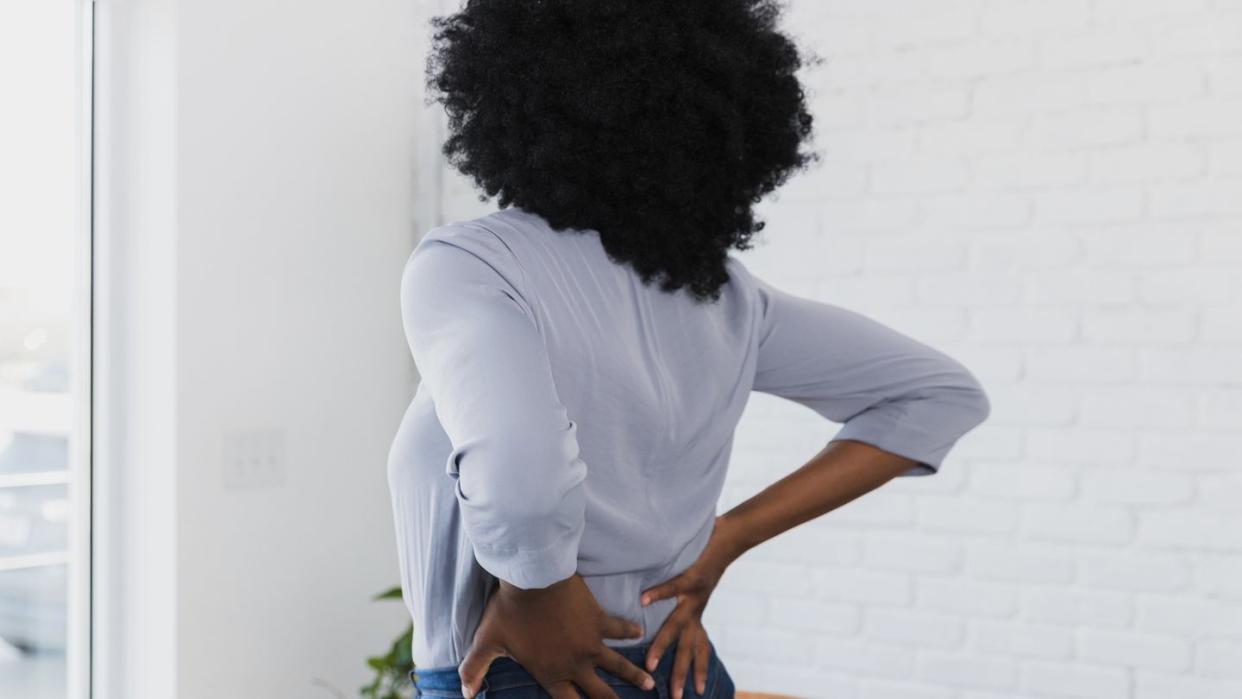Doctors Say Your Back Pain Could Be Linked to IBS

Irritable bowel syndrome—better known as IBS—is a condition with a lot of mystery around it. Doctors aren’t entirely sure what causes IBS and there is a big range of symptoms. With that, it’s understandable to wonder if something you’re experiencing could be a sign of IBS or something entirely different, leaving you searching for things like “can IBS cause back pain?” when you’re uncomfortable.
Here’s the deal: At baseline, back pain isn’t a known symptom of IBS (which is probably why you’re wondering what’s going on). But doctors say back pain can happen as a result of having the condition. It’s a little confusing, we know.
Meet the experts: Rudolph Bedford, M.D., board certified gastroenterologist at Providence Saint John’s Health Center in Santa Monica, CA; Bryan Curtin, M.D., director of neurogastroenterology and motility at The Institute for Digestive Health and Liver Disease at Mercy Medical Center
Here’s the deal with back pain and IBS, plus what to do if you’re experiencing it.
What is IBS?
IBS is a gastrointestinal disorder of the large intestine, according to the National Institute of Diabetes and Digestive and Kidney Diseases (NIDDK). While the exact cause of IBS isn’t known, it’s believed to be linked to an issue with the way your gut and brain work together.
As a result, your gut can be more sensitive than usual, leading to changes in the way that the muscles in your bowel contract, per the NIDDK.
While many people associate IBS with diarrhea, there are actually different types of the condition. Here’s a breakdown:
IBS-D: This type of IBS has a major symptom of diarrhea (which is what the “-D” stands for). With IBS-D, more than a quarter of your poop is loose or watery on days when you have unusual bowel movements.
IBS-C: This form of IBS is marked by constipation. With IBS-C, more than a quarter of your abnormal BMs are hard or lumpy, or you have trouble going.
IBS-M: With IBS-M, you have a mix of diarrhea and constipation. This form of IBS causes at least of a quarter of your unusual BMs to be diarrhea, while the other quarter are constipation or hard, lumpy stools. Essentially, half of your poop is either constipation or diarrhea on abnormal days.
IBS symptoms
The symptoms of IBS can range based on the type of the disease that you have, as well as how you personally experience IBS. However, the Cleveland Clinic says that these are the major symptoms of IBS:
Stomach pain or cramps, usually related to the urge to poop
Excess gas and bloating
Diarrhea, constipation, or alternating between the two
Mucus in your poop
Feeling like you’re unable to empty your bowels after pooping
Can IBS cause back pain?
While back pain isn’t a major symptom of IBS, it can happen, says Bryan Curtin, M.D., director of neurogastroenterology and motility at The Institute for Digestive Health and Liver Disease at Mercy Medical Center. “Irritable bowel syndrome is a clinical diagnosis made in patients with a combination of abdominal pain combined with diarrhea, constipation, or a mix between the two,” he explains. “However, many patients will experience additional symptoms than just these two elements such as nausea, bloating, and early satiety.”
Back pain can be an “associated” symptom, he says, noting that it’s more common in people who are constipated. A lot of this has to do with the nerve density in your digestive system, Dr. Curtin says. “If you cut your hand, you generally know exactly where the injury has occurred with great specificity,” he says. But with organ pain like you might get with IBS, the pain “can manifest in different areas and back pain can present like this,” he says.
This back pain can also happen as a result of gas buildup in the lower abdominal area, says Rudolph Bedford, M.D., board certified gastroenterologist at Providence Saint John’s Health Center in Santa Monica, CA. “It usually feels achy and dull,” he adds.
If you’re having back pain and you know (or suspect) that you have IBS, Dr. Curtin says it can be helpful to get an X-ray when you’re in pain to see if your colon is full of stool. “Constipation is underestimated as a cause of abdominal pain quite frequently,” he adds.
How to treat IBS back pain
There are a few things you can do to get relief from IBS back pain. The biggest one is to treat the IBS itself, Dr. Bedford says. That can involve taking medications like certain antibiotics, laxatives, antispasmodics, or antidepressants—but you should consult a doctor before diving into any of those (plus, you might need a prescription).
“Stretching and massaging your back may help, too,” Dr. Bedford says. If you have IBS-D, taking an anti-diarrheal medication like loperamide could help slow things down, he says. And, if constipation is an issue for you, increasing your fiber intake and drinking more water may help. “There are also a variety of medications we can use,” Dr. Bedford says.
Finding ways to cope with stress and anxiety may also help you get relief, he says.
When to see a doctor
If you’re having a combination of IBS-like symptoms with constipation, abdominal pain, and back pain, Dr. Curtin recommends that you see a doctor for an evaluation. If you end up diagnosed with IBS and get treated for the condition, “the back pain may improve as well,” he says. And, if you already know that you have IBS, it’s still important to check in with your doctor to see if there are any other potential treatments that can help.
Dr. Curtin points out that you can also have back pain and IBS, with one having nothing to do with the other. “Back pain is also incredibly common independent of IBS, so I would not immediately think the gut [is to blame] if back pain is the primary problem,” he says.
You Might Also Like

